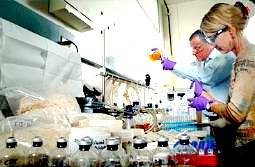Branches of Biology
Online Biology Dictionary
Page 2

The following is a list of the branches of biology, with definitions, pronunciations, and links to related topics. Note, however, that there are so many subbranches within the general field of biology that they cannot be fully listed here. There are many named branches of the discipline that can be found in dictionaries, but that are little known and have few practitioners. The following list, then, attempts to name and define only the major fields:
Branches of biology dealing with microorganisms and microscopic structure:
- Cytology (/sī-TALL-ə-jee/) — The study of living cells, in particular, their physiological properties, structures, organelles, and method of division.
- Histology (/hist-TAWL-ə-jee/) — The study of the microscopic structure of cellular tissue.
- Microbiology (/MIKE-rō-bī-AWL-ə-jee/) — The branch of biology that studies microorganisms and their effects on other organisms.
- Palynology (/PAL-in-NAWL-ə-jee/) The study of fine organic particulate matter, such as pollen grains and spores, present in air, water or sedimentary deposits.
- Protistology (/prō-tist-AWL-ə-jee/) — The study of protists.
Medical branches of biology:
- Anatomy (/ə-NAT-ə-mee/) — The study of the macroscopic structure of multicellular organisms.
- Embryology (/em-bree-AWL-ə-jee/) — The study of embryos.
- Endocrinology (/end-ə-krən-AWL-ə-jee/) — The study of the endocrine glands.
- Epidemiology (/EP-ə-DEE-mee-ALL-ə-gee/) — The study of the incidence of disease within populations, and of optimal measures for its control.
- Esthesiology (/es-theez-ee-AWL-ə-jee/) — The scientific study of sensation.
- Genetics (/jə-NET-iks/) — The study of heredity, especially the mechanisms of hereditary transmission and variation of inherited characteristics.
- Immunology (/IM-yə-NAWL-ə-jee/) The study of the structure and function of the immune system, innate and acquired immunity, the bodily distinction of self from nonself, and laboratory techniques involving the interaction of antigens with specific antibodies.
- Koniology (/kone-ee-AWL-ə-jee/) The study of dust in relation to its effects on health.
- Mastology (/mast-TAWL-ə-jee/) — The scientific study of the breasts.
- Medicine — The art and study of the prevention, cure, and alleviation of disease, and the care of the injured.
- Neurology (/n(y)oo-RAWL-ə-jee/) — The branch of biology that studies the nervous system and its diseases.
- Parasitology (/pare-ə-sə-TAWL-ə-jee/) — The study of parasites.
- Pathology (/path-AWL-ə-jee, pə-THAWL-/) — The study of the nature of disease and its causes, processes, development, and consequences.
- Physiology (/fizz-ee-AWL-ə-jee/) The study of the physical function of living organisms.
- Pharmacology (/FARM-ə-CAWL-ə-jee/) The science and study of drugs.
- Psychology (/sī-KAWL-ə-jee/) — The study of human behavior.
- Splanchnology (/splank-NAWL-ə-jee/) The study of the internal organs.
- Surgery (/SERJ-er-ee/) — The branch of medicine dealing with operative procedures.
- Toxicology (/tawks-ə-KAWL-ə-jee/) — The study of toxins.
- Urology (/yer-AWL-ə-jee/) — The study and treatment of disorders of the urogenital organs.
- Virology (vire-AWL-ə-jee/) — The study of viruses.
Miscellaneous branches of biology:
- Botany (/BAWT-(ə)-nee/) — The study of plants.
- Marine biology — The study of marine organisms.
- Mycology (/mike-AWL-ə-jee/) — The study of fungi.
Page 2